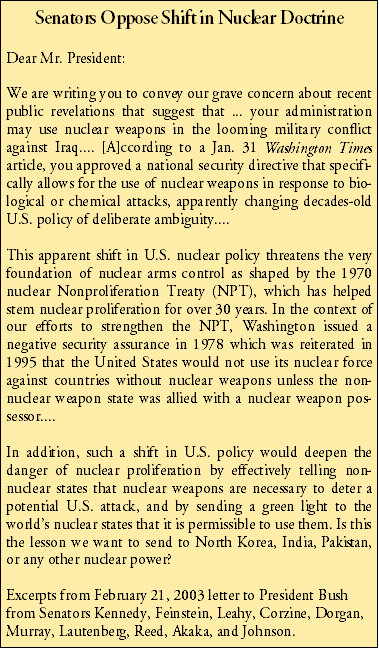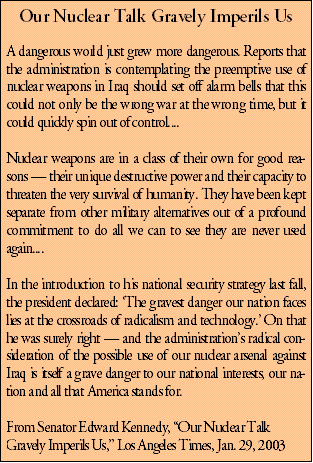A National Strategy to
Promote Nuclear Weapons? |
||||
| In December 2002, the Bush administration released its "National Strategy to Combat Weapons of Mass Destruction." Unfortunately, what the strategy really does is promote nuclear weapons. The administration declared that the United States "reserves the right to respond with overwhelming force - including through resort to all of our options - to the use of WMD against the United States, our forces abroad, and friends and allies." "All of our options" encompasses both "conventional and nuclear response" capabilities, employed in "appropriate cases through preemptive measures." Consistent with the policy, in January the Los Angeles Times reported that the Pentagon is planning for possible U.S. use of nuclear weapons to respond to or "preempt" any Iraqi use of chemical and biological arms in response to a U.S. invasion and to attack deeply buried targets. While elements of this policy have been signaled in various ways in
past administrations, the December statement is the first time it has been unambiguously
stated in an unclassified document with a presidential imprimatur. It comes at a time of
preparation for a war on Iraq in which, as the CIA warned, U.S. forces could confront
Iraqi use of chemical or biological weapons. Reflecting a decade long campaign of the U.S.
nuclear establishment to create a new mission for nuclear arms following the collapse of
the Soviet Union, 60% of Americans support a U.S. nuclear response in that circumstance
according to a December 2002 Washington-Post ABC News poll. The policy should be renounced. It is irrational, illegal, and immoral. It is irrational because increased U.S. reliance on nuclear arms encourages other states - and possibly terrorists - to acquire them, and ultimately increases the risk that a nuclear explosion will take place on American soil. While some states may reject acquiring a nuclear arsenal in part because they fear a U.S. "counter-proliferation" attack, perhaps even a nuclear one, other states may calculate that nuclear arms are the only feasible balance against U.S. military might. North Korea is exhibit one. It has announced its withdrawal from the Nuclear Nonproliferation Treaty and taken initial steps towards resumption of production of plutonium for nuclear weapons. There could be no better illustration that a "do as I say, not as I do" approach, even when backed with a military threat, is bound for failure. Emphasizing the nuclear threat also increases pressure to resort to nuclear weapons in the event of enemy use of chemical or biological weapons even though common sense would dictate otherwise. Otherwise the threat, and U.S. credibility, will come to seem hollow. The assumption of equivalence among nuclear, chemical, and biological weapons underlying the threat is false. Nuclear arms are orders of magnitude more destructive than the other "weapons of mass destruction." The WMD Strategy, together with the September 2002 National Security Strategy, also invites imitation by other states of the "preemptive measures" doctrine, by which the Bush administration really means preventive war of the kind planned for Iraq. Other states may decide that their security demands a similar approach, for example India in relation to Pakistan, or Russia in relation to bordering Islamic countries.
Finally, the policy is immoral because it reinforces the threat of mass nuclear destruction at the core of U.S. foreign policy, and introduces a new element at odds with U.S. tradition, the right to initiate war, not simply to respond to an attack. A path of abolition of nuclear weapons, at home as well as abroad, would meet the demands of law and morality and make all of us much more secure. An earlier version of this article was distributed by Minuteman
Media on January 1, 2003
|
||||

 The new policy is illegal
because nuclear weapons cannot be used in a discriminate and proportionate fashion as
required by international law acknowledged by the U.S. military services. There is much
talk now of the need for "bunker busting" nuclear explosives. But earth
penetrators are likely to cause large numbers of civilian deaths because of the immense
amounts of radioactive dust they would kick up. (For more analysis, see "The
Lawfulness of ‘Low-Yield,’ Earth-Penetrating Nuclear Weapons," at
The new policy is illegal
because nuclear weapons cannot be used in a discriminate and proportionate fashion as
required by international law acknowledged by the U.S. military services. There is much
talk now of the need for "bunker busting" nuclear explosives. But earth
penetrators are likely to cause large numbers of civilian deaths because of the immense
amounts of radioactive dust they would kick up. (For more analysis, see "The
Lawfulness of ‘Low-Yield,’ Earth-Penetrating Nuclear Weapons," at